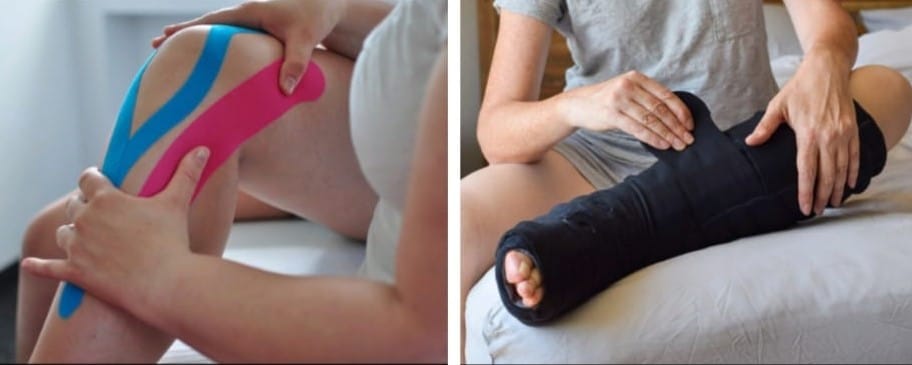
Edema, or swollen legs, occurs when excess fluid collects in the tissue of your legs, making them puffy and swollen. One leg or both may be affected by mild or severe swelling.
Swelling of the leg and feet may be mild in some cases, with just the ankles or feet being slightly swollen, and very severe in others where the entire leg is swollen and painful to move or walk. The affected leg may feel heavy and achy, and the skin over the swollen area may look shiny and stretched tight and stretched.
Swelling in the legs may be caused by standing or sitting for long periods, by injury or by a more serious underlying medical condition, such as heart failure, kidney disease or venous insufficiency. Occasionally, worse leg swelling may be due to medications or a salt-rich diet. If you have leg swelling that is severe or persistent, consult a doctor to find and treat the cause. It can be treated with lifestyle changes (like putting your legs up), medicines or surgery occasionally. Your lymph nodes in your groin area could get enlarged if you have leg swelling. Your lymphatic vessels in your legs drain into lymph nodes in your groin. Any flow problem, inflammation or infection in your leg can cause lymph node swelling.
Vascular disease in the veins or arteries in the legs can cause swollen legs. Two of the more common types of vascular diseases that can result in swollen legs are peripheral venous disease (PVD) and.
PVD happens when the veins in your legs weaken and/or become damaged, causing blood to collect in the legs and feet. Swelling, pain and skin changes (discolouration and ulcers) can occur.
Common Causes of Leg Swelling
Leg swelling, known as Edema, can result from several things. Some common causes of leg swelling include:
- Prolonged standing or sitting: If you spend a lot of time standing or sitting in a fixed position, fluid will pool in the legs, and the legs will swell.
- Injury: Swelling may result from trauma to the lower leg (for example, sprain, strain or fracture).
- Venous insufficiency: It happens when the leg veins don’t work well so they cannot keep the fluid from collecting and causing swelling.
- DVT: Deep vein thrombosis (DVT), a blood clot that forms in a deep vein in the leg and can lead to swelling, pain and redness.
- Lymphedema: It occurs when the lymphatic system doesn’t work the way it is supposed to and can cause the legs to swell.
- Heart failure: If your heart isn’t pumping enough blood, fluid can build up in your legs, which causes swelling.
- Kidney disease: If your kidneys can’t work well enough, you may have fluid build up in your legs and other parts of your body.
- Medications: Some medications (calcium channel blockers or nonsteroidal anti-inflammatory drugs, NSAIDs) can cause swelling of the legs as a side effect.
- Medical conditions: When fluid builds up in the legs, for instance, this could be the result of a medical condition such as heart failure, liver disease or kidney disease.
Things That Cause Fluid Buildup
Several different factors can cause fluid buildup or edema The following are some common causes of fluid buildup:
- Inactivity: Blood and fluid can pool when you sit or stand for long periods and pool, causing fluid buildup.
- High salt intake: If you eat too much salt, your body will retain water, and you may have fluid buildup.
- Certain medications: Certain blood pressure medicines, steroids, steroidal anti-inflammatory drugs (NSAIDs) and other medications can cause fluids to build up as a side effect.
- Hormonal changes: Fluid buildup may be caused by hormonal changes during the menstrual cycle or pregnancy.
- Medical conditions: Specific medical conditions such as heart failure, liver disease, and kidney disease can cause fluid buildup in different parts of the body.
- Injuries: Inflammation or fluid buildup may happen if you’ve injured yourself, such as with sprains or fractures.
- Lymphedema: Lymphedema Underlying problem is a malfunction of the lymphatic system, causing fluid to build up in parts of the body.
- Surgery: Fluid builds, commonly in the healing process after surgery.
- Heat: If it’s hot outside, your body may hold more fluid, causing swelling or fluid buildup.
Treatments for Swollen Legs

Medical treatment of swollen legs depends on what’s causing the swelling. Here are some common medical treatments that a healthcare professional may recommend:
- Medications: A healthcare professional may recommend medications depending on the cause of the swelling. Commonly used to treat peripheral edema, diuretics are a drug that helps remove excess fluid from the body.
- Compression stockings: Having wear compression stockings can help with circulation by making the legs not so swollen. These stockings place pressure on the legs which makes the fluid to flow out from the affected part.
- Surgical procedures: In rare cases, surgery will be needed to treat the cause of the lump. For example, if it is from varicose veins, that person may want you to have surgery to have those varicose veins removed or treated.
- Lifestyle changes: Some lifestyle adjustments that may help minimize swelling in the legs are maintaining a healthy weight, exercising regularly, and avoiding too much salt.
- Elevation: Raising the legs can reduce the swelling by letting the fluid drain away from the place. Propping up the legs on pillows or other supportive objects will help achieve this.
If you have persistent or severe leg swelling, you must talk to a healthcare provider, it could be due to a health condition. They can also figure out what’s causing the swelling and come up with the right treatment plan. With proper medical treatment and life changes as indicated, you can prevent swelling in your legs, which will help you feel healthy and better overall.
Possible causes for fluid retention
Fluid retention is vital to note, so it being a sign of some underlying disease condition, it needs consulting a health care provider if fluid retention persists or is severe.
There are ways to help identify what the root cause is and make a proper treatment plan.
Heart, kidney, or liver disease
Heart disease, kidney disease, or liver disease can all cause swollen legs. If the heart, kidneys, or liver don’t work right, fluid builds up all over the body — including in the legs.
- Heart disease: It can cause blood to back up in the veins and make blood not move as well from the legs, which can cause fluid to build up and the legs to swell.
- Kidney disease: When kidney function is impaired, the body cannot excrete excess fluid, and as a result, fluid retention and swelling occur throughout different body parts (and especially the legs).
- Liver disease: If the liver isn’t working properly, fluid may build up in the abdomen or legs, causing swelling.
Conclusion:
There are a range of factors that can lead to swollen legs, and it’s often a sign of an underlying health condition. Leg swelling will need a medical advice to determine the root reason and how to treat said issue. For most people, easy lifestyle changes, such as exercise, leg elevation, and compression, can reduce swelling and improve circulation.

FAQs
What causes swelling of the legs?
A number of factors can cause swelling of the legs. Common causes comprise:
Inactivity.
Injury or trauma.
Fluid retention.
Are swollen legs serious?
Medical conditions that can cause swollen legs include underlying medical conditions and some are serious. The seriousness of the swelling depends on the reason for the swelling. For example, swelling can be a sign of a more serious condition such as heart failure and, therefore, should be addressed immediately. Swelling due to a blood clot can be a medical emergency and needs urgent treatment as well.
What are you doing to alleviate swelling in your legs?
Here are some ways to reduce swelling in the legs:
Elevation.
Compression stockings.
Exercise.
Massage.
Limit salt intake.
Why do you get swollen legs?
Heart failure.
Kidney disease.
Liver disease.
Blood clots.
Lymphedema.
Can swollen legs be cured?
The treatment of swollen legs depends upon the cause of the problem. Sometimes, a cure for the underlying problem can cure the leg swelling. For example, if the swelling is related to an infection and antibiotics are used to treat that infection, the swelling will improve.
How good is medicine for swollen legs and feet?
Several types of medications are prescribed for treating swelling in the leg and feet since the cause may be many. Here are some examples:
Diuretics.
Blood thinners.
Antibiotics.
Medications like other anti-inflammatory drugs.
Why are the legs swollen?
A number of problems can cause swelling of the legs. Common causes comprise:
Inactivity.
Injury or trauma.
Fluid retention.
Is swollen legs curable?
Treatment for swollen legs depends on why you have them. Sometimes, the underlying condition may be cured, for which swelling in the legs may also be resolved. If the swelling is caused by infection, then antibiotics may help this swelling to resolve.
Why swollen legs and feet medicine is preferred?
Treatment for swelling in the legs and feet may include several types of medications, depending on the reason for the swelling. Here are some examples:
Diuretics.
Blood thinners.
Antibiotics.
Medications that reduce inflammation.
Cause of Swollen legs from the knee down?
Swollen legs from the knee down can be caused by several factors, including:
Edema: The most common cause of swelling is excess fluid accumulating in the lower legs. Usually this is due to standing or sitting for long periods, especially in hot weather, or salt retention.
Injury: Swelling in the thigh, or at least that on the affected leg, can be caused by trauma to the leg such as sprains, strains, or fractures with the body increasing blood flow to the area as a response to healing.
Venous insufficiency: It happens when the veins in the legs do not succeed in returning blood to the heart properly, which in turn causes fluid to build up and swell in the lower legs.
Infection: Localized swelling, redness, and pain can be caused by skin infections (like cellulitis) or infections in the tissues deeper in the leg.
Blood clots: A deep vein thrombosis, or DVT, can make one leg swollen and sometimes painful, as well as red and warm. It is a serious condition so immediate medical attention is needed.
Heart, kidney, or liver disease: These can impact the body’s ability to manage fluid balance, and causes swelling (edema), particularly in the legs and feet.
Pregnancy: Swelling in the lower legs can be due to hormonal changes and increased pressure from a growing uterus — especially later in pregnancy.
Seek medical advice if swelling is persistent or occurs with pain, redness or difficulty breathing, in order for the doctor to rule out serious conditions.
what is edema?
Edema is swelling resulting from excess fluid in the body's tissues. Normally in the feet, ankles, legs, and/or hands, it can occur anywhere on body. There are many reasons why edema can occur — things like injury, infection, poor circulation, medications, even certain underlying health conditions, like heart, kidney or liver disease, can also lead to edema. In some cases, there's no cause for worry and the edema may be temporary and harmless, but if it becomes persistent and is accompanied by other symptoms you should call for medical attention to find the cause and treatment.
why are my legs swollen?
The cause of swollen legs can be anything from the common cold to an underlying condition and consideration should be given to any other symptoms and any conditions. Some common causes include:
Fluid Retention (Edema): Excess fluid build up in the tissue (especially in the legs) is the most common. Sitting or standing for long periods, hot weather, eating a high salt diet, or being pregnant can all cause it.
Injury: Swelling can occur with an injury to the leg, such as a sprain, strain, or fracture as the body brings extra blood flow to the injured area.
Venous Insufficiency: When the veins in your legs cannot return blood effectively to the heart, blood can collect in the lower legs. Swelling is common, especially from standing or sitting for a long time.
Blood Clots: A DVT is a blood clot that forms in the deep veins — often in the legs. This can swell badly, hurt, turn red, and you need to run to the medical people.
Heart, Kidney, or Liver Disease: Your heart, kidney, or liver conditions can weaken how your body copes with fluid balance so you can have swelling in your legs and feet.
Infections: Swelling, redness, and warmth can occur in the affected area due to cellulitis (skin infection) and or other infection in the leg.
Medication Side Effects: Fluid retention and subsequent swelling can be a side effect of some medications, such as for the treatment of high blood pressure or Corticotherapy or hormonal therapy.
A sudden onset of swelling that is painful, accompanied by other symptoms such as redness, difficulty breathing, fever, itchiness, or discharge should be checked by a healthcare professional diagnosis and for specific treatment.
For more information Frequently Visit Better Life Carez



Comments are closed.